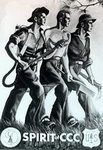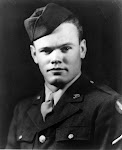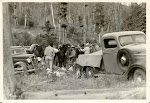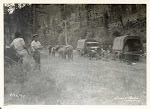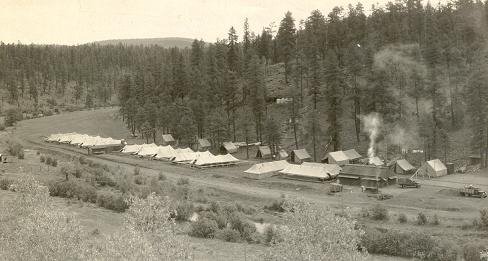 Imagine feeling lonely and happy at the same time. That must be the feeling that many CCC enrollees had when special days like Thanksgiving, Christmas and New Year’s rolled around each year. Surely the feeling must be akin to the feelings a young soldier has, living in a barracks far from home during the holidays: a touch of warmth from the season, tempered by a twinge of loneliness and homesickness, charged with a bit of excitement over the thought of having a day off and a grand meal in the mess hall. Some of the lucky boys have gone home for Christmas so the camp is somewhat deserted and perhaps covered in a blanket of snow. The camp commander seems a bit more cordial than usual, stopping in each barracks to chat with the enrollees after the crews returned from the work site. A group of enrollees are in the mess hall helping the kitchen crew decorate for the big dinner and as darkness settles on the forest camp, they can be seen through the windows of the mess hall stringing crepe paper. Perhaps being stuck in camp won’t be so bad after all.
Imagine feeling lonely and happy at the same time. That must be the feeling that many CCC enrollees had when special days like Thanksgiving, Christmas and New Year’s rolled around each year. Surely the feeling must be akin to the feelings a young soldier has, living in a barracks far from home during the holidays: a touch of warmth from the season, tempered by a twinge of loneliness and homesickness, charged with a bit of excitement over the thought of having a day off and a grand meal in the mess hall. Some of the lucky boys have gone home for Christmas so the camp is somewhat deserted and perhaps covered in a blanket of snow. The camp commander seems a bit more cordial than usual, stopping in each barracks to chat with the enrollees after the crews returned from the work site. A group of enrollees are in the mess hall helping the kitchen crew decorate for the big dinner and as darkness settles on the forest camp, they can be seen through the windows of the mess hall stringing crepe paper. Perhaps being stuck in camp won’t be so bad after all.Christmas 1933 marked the first celebration of the holiday in the life of the CCC, and nationwide it was a special event marked by extraordinary efforts to bolster the morale of enrollees in camps from one end of the country to the other. In his book, The Civilian Conservation Corps in Alabama, 1933-1942 by Robert Pasquill, Jr. noted the following:
On December 22, 1933, the Gadsden Times announced that the 315,000 CCC men across the nation would be having a real Christmas. Camps were decorating trees. A special radio program was to be broadcast by the National Broadcast Company with messages by Director Fechner and Secretary of Agriculture Wallace. The railroads were offering special rates to enrollees. Some 445,000 were to be served for Christmas dinners.
The literature on the CCC is full of accounts of how the holidays were celebrated in the camps, which were really like small communities. Enrollees could save up leave during their enrollment and, when Christmas and New Year rolled around, the lucky ones would have an opportunity to return home for the holidays.
In Coming of Age in the Great Depression: The Civilian Conservation Corps Experience in New Mexico, 1933-1942, Richard Melzer noted:
Two of the biggest holidays of the year, Christmas and New Year’s, left many camps largely deserted. Fifty percent of the enrollees at SCS-4-N at El Rito were granted five-day leaves to go home for Christmas in1936, while the remaining fifty percent took their five-day leaves during the New Year’s holiday. Aware that a large percentage of all desertions occurred following major holidays, prudent officers took this opportunity to remind enrollees of the dire consequences of going AWOL. Although sometimes late, most enrollees returned to camp out of a personal sense of duty as well as a sincere desire to continue helping the loved ones they had just visited back home.
Naturally, not every enrollee was able to return home; some remained in camp at Christmastime and perhaps over New Years. Sympathetic commanders and technical staff usually tried to make the time as pleasant as possible.
The December 1936 issue of the North Woodstock, N.H. camp newspaper, The Pioneer, offered this glimpse of life in the camps over the holidays:
Lt. White, in a very jovial mood, made an impromptu speech in which he said in effect that the camp was ours for the day and that he wanted us to act as though we were at home with our families. The talk was received with enthusiasm by the men and they proceed to carry the lieutenant’s suggestion into effect, seldom have we heard so much noise everybody had a great deal of fun. We congratulate the lieutenant, the mess steward and the kitchen staff, they did a fine job.
(Quoted in Builder of Men: Life in the C.C.C. Camps of New Hampshire by David d. Draves.)
Borrowing from a practice started by U.S. soldiers in France during World War I, enrollees in some CCC camps would “adopt” children from the local community to help insure they had at least a small gift for Christmas, sometimes hosting parties at the camp with an appearance by Santa Claus himself. Writing in the Fall 2001 edition of The Historian, Robert A. Waller refers to one such CCC company:
South Carolina veterans camp Co. 2414 at Sumter (S.C.) enjoyed the most publicity in Happy Days when their 1934 Christmas party for the community children enjoyed pictorial coverage.
The social activities of the young men during their off-hours on weekends consumed much newsprint in Happy Days. The CCC boys created their own social life, often in connection with nearby communities during holidays or on the anniversary of the founding of the “Cees.” The commander of Co. 4486 at Liberty (S.C.) organized a Christmas dinner dance with music provided by the Jungaleers of Clemson College.
(From Happy Days and the Civilian Conservation Corps in South Carolina, 1933-1942 by Robert A. Waller, published in The Historian Vol. 64, No. 1, Fall 2001.)
In the December 1937 issue of The Score of 2704 at Camp SCS-14, Chatfield, Minnesota, the editors wrote of their regret at the impending disbandment of the Company, but looked forward to their final Christmas celebration together.
Dinner – Smoker Party on Program. Big Doin’s Planned. Here is the real news – before this company becomes history, there is going to be a great “going’s on.” As we go to press the date for the big event has not been decided, but we believe it will be next Friday nite.
There will be an extra special dinner in the mess hall coming soon. From what we hear it is going to be a second Thanksgiving feast.
 But the real fun will be when the recreation hall is turned into a Monte Carlo. Each man will be handed a roll of five hundred dollars. What will he be able to do with his money?? There will be raffle wheels, bingo games and many ways for the men to spend and keep spending. The canteen will be open for business as usual, if there is any business, but with five hundred iron men one should buy something. Of course prices will be a little high. Candy and pop will sell for one hundred bucks at the bar. Cigarettes will go for the paltry sum of three hundred dollars. Of course the money will all be phoney and it will have to be used on our Monte Carlo nite. Is such a party fun?? Just read the story of a party like this one held by the men in this company when it was located up north.
But the real fun will be when the recreation hall is turned into a Monte Carlo. Each man will be handed a roll of five hundred dollars. What will he be able to do with his money?? There will be raffle wheels, bingo games and many ways for the men to spend and keep spending. The canteen will be open for business as usual, if there is any business, but with five hundred iron men one should buy something. Of course prices will be a little high. Candy and pop will sell for one hundred bucks at the bar. Cigarettes will go for the paltry sum of three hundred dollars. Of course the money will all be phoney and it will have to be used on our Monte Carlo nite. Is such a party fun?? Just read the story of a party like this one held by the men in this company when it was located up north.
It’s difficult to imagine celebrating a Christmas or New Year holiday in the midst of the Great Depression. It’s even more difficult to imagine facing the holidays in a CCC camp far from home with five dollars or less in your pocket and not much more than the prospect of a big dinner in the mess hall to keep your spirits buoyed up, but that’s what happened in hundreds of thousands of cases at thousands of camps scattered across the United States between 1933 and 1942. Who could know that with the advent of war, those bittersweet holidays in the CCC would be looked back upon with fondness by the grown men who left the CCC to fight across the world from 1942 to 1945?
